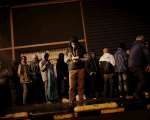- Text size
 |
|  |
|  |
| 
- عربي
UNHCR facilitates the return of 51,000 Afghans refugees from Pakistan
News Stories, 27 August 2015
ISLAMABAD, Pakistan, Aug 27 (UNHCR) – Ghulam Sakhi, 45, had mixed feelings about going back to Afghanistan after 25 long years living as a refugee in Pakistan.
However, like most refugees who choose to return to Afghanistan, Sakhi is optimistic about the future of his country. His hopes of a brighter future for his homeland outweigh any lingering doubts.
As a result, Sakhi found himself leading a group of 62 Afghan refugee families (265 Ind) who opted to return to Herat under the UN refugee agency's Facilitated Group Returns (FGR) programme.
"There are still enormous challenges in some parts of Afghanistan but I and my family decided to return because the security situation and livelihood opportunities have improved in Herat," he said.
Sakhi's community is the first facilitated group return from Pakistan this year, so far. The group had been residing in Loralai District in the northeast of Balochistan province in Pakistan.
Back in Herat the elders of the group recently purchased land to settle down and under the FGR scheme, UNHCR stepped in to provide extra assistance that made this move viable.
UNHCR then developed a special package for each family in addition to its regular assistance of US $200 per person cash assistance. Every family in the group, received a winterization kit and a package of essential relief items.
So far this year UNHCR has assisted over 51,000 registered Afghan refugees from Pakistan to return to Afghanistan under the agency's largest and longest running voluntary repatriation programme. Of the total returnees, the majority, some 26,000 Afghans), returned from Khyber Pakhtunkhwa province, followed by 5,800 from Balochistan; 11,300 came from Punjab; 4,000 from Sindh and 2,800 from Pakistan administered Kashmir.
In Afghanistan the majority, 34 per cent, returned to the northern region of Afghanistan, followed by the 31 per cent who went to the central regions while 19 per cent of the Afghan refugees returned to the eastern region. Only nine per cent of total returns were to the south east while return to the southern regions remain the lower at five per cent because security there remains a challenge.
Dinesh Lal Shrestha, Head of UNHCR in Balochistan, while bidding farewell to the members of the facilitated group return said: "Voluntary repatriation is a cornerstone of the Solution Strategy for Afghan Refugees (SSAR)."
Shrestha said he hoped that with the formation of the National Unity Government and gradual political stability and better livelihood prospects in some parts of Afghanistan more refugees might opt to voluntarily repatriate to Afghanistan.
On 21 August during the 26th meeting of the Tripartite commission in Kabul, the governments of Afghanistan, Pakistan and UNHCR once again reiterated their commitment to the voluntary repatriation of Afghan refugees, in safety and with dignity, based on considerations regarding the absorption capacity of Afghanistan.
The parties agreed that voluntary repatriation continued to be the preferred durable solution for Afghan refugees in Pakistan.
Indrika Ratwatte UNHCR's Representative in Pakistan commended the continuous generosity of Pakistan for extending support to the millions of Afghan refugees in the country and highlighted the need for repatriation to be voluntary, in safety and dignity to ensure sustainable reintegration.
"Afghanistan is rich in human resource, youngsters aged 12 to 30 constitute 44 percent of the total registered refugee population in Pakistan, with great potential to excel if provided the right conditions," Ratwatte said, adding that: "it is therefore important for all the stakeholders to invest more in the sectors of education and skills training to enable these youngsters to play a productive role in the development of Afghanistan once they return to their country."
With the voluntary return of approximately 3.9 million Afghan refugees since 2002 until to date, Pakistan remains home to some 1.5 million Afghan refugees which is the world's largest protracted refugee population.













































